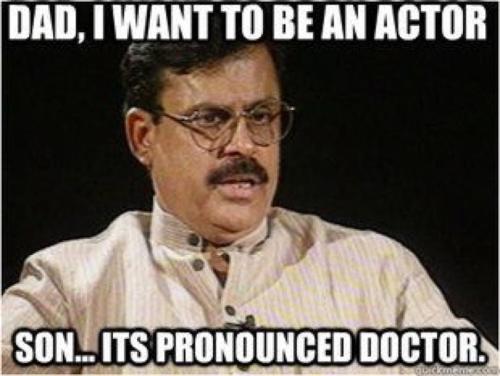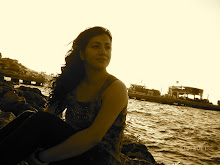“The Holy (And Sinful) Careers of South Asian Americans” by Farah Akbar, Goatmilkblog.com
FARAH AKBAR

Amrik Singh, 60 could not bear the thought of his children turning into anything other than doctors. God forbid they turn into teachers or gasp, social workers – like him. Coming from a family of farmers, he immigrated to the United States from India almost 4 decades ago. Today he beams with pride when he says that all three of his children are now doctors.
“If you are a doctor, right away you become a great achievement in both American society and Indian society,” he says confidently. He does not pretend that it is all about social status either though. The money that doctors earn in the United States is just too darn good. “You don’t know. There is economics here,” he insists. Singh is firm in his belief that a relatively high income is necessary to have “made it” in the United States. “The idea for coming here was to be economically successful. There is no point in living hand to mouth,” he insists.
Numbering at about 2.7 million, South Asians living in the United States hail from India, Pakistan, Bangladesh, Nepal, Bhutan and Sri Lanka. South Asians, and Indian Americans in particular, continue to fill many important positions in science and technology. Indians, who make up less than two percent of the American population, today make up five percent of all doctors and account for ten percent of all medical school students. There are also thousands of Pakistani Americans practicing medicine. Indians are three percent of the nation’s engineers and seven percent of its IT workers.
Many children of South Asian parents deal with what the say is an unrelenting familial pressure to pursue only certain careers, like medicine and engineering. These days, law and finance seem to be making the cut as well. What results for some of these children in their adulthood is a lack of job satisfaction and a frustration of not having pursued their passions.
These days, more South-Asian Americans are defying tradition and are taking their chances in careers that would cause Amrik Singh and others of his generation nightmares. They are becoming writers, designers and activists to name a few. They do so despite the criticisms they face from their communities, the relative lack of job safety for some occupations and the cut in pay.
“There is a construction of a cliche of what success is,” says Dr. Vijay Prashad. Dr. Prashad, professor of international relations at Trinity College says that it is no accident that so many young South Asians find themselves working in math and science fields. According to his book, “The Karma of Brown Folk,” the governmental policies of India have much to do this phenomenon. In 1947, Jawarharlal Nehru, the first prime minister of India said that the “new India” would be “closely linked to science” and made it a priority to create state-funded learning institutions devoted to science. The trend has not changed even today.
The institutions created a generation of skilled workers mostly from the middle class, many of whom would make their way into the United States via the 1965 Immigration and Nationality Act. Between 1966 and 1977, thousands of scientists with PhDs, engineers, and doctors came from India alone. The majority of Pakistani immigrants who arrived between 1965 and the early 1980s also came as skilled migrants.
Dr. Prashad argues that children tend to follow the career paths of their parents which he claims also contributes to the large numbers of young South doctors and engineers.
Despite these impressive accomplishments, are young South Asian doctors, engineers, pharmacists and the like happy in their careers? From a financial perspective, probably. Such careers continue to fetch more money than most other fields.
For some though, the money does not make up for everything. Always very close to her parents, Dr. Alka Chandna would have no contact with her’s for two months after she announced to them that she was leaving her job as a software developer to work with People for the Ethical Treatment of Animals (PETA) full time. Her voice still breaks as she recalls the day she told them about her decision. “They thought I was entering a black hole, a world they didn’t understand,” she says softly. “I’ve blocked the conversation from my mind,” says Chandna, who lives in Washington D.C.
Like many South Asians, Chandna was encouraged to pursue medicine but refused, believing that it was morally wrong to use animals for dissections in medical school. While her two sisters would go on to become physicians (and her brother an engineer) Chandna went on to get a PhD in mathematics, just like her father (her mother also has a PhD).
She understands why her parents wanted her to pursue a career in science. Chandna grew up in Canada experiencing racism; she remembers having her house spray painted and having eggs thrown at it. “Going the profession route was the path out of that life,” she says.
Today she is PETA’s Laboratory Oversight Specialist where she studies the regulations and guidelines that govern the use of animals in laboratory settings. Her relationship has improved with her parents since that fateful day ten years ago. “It wasn’t as horrible as they were worried it was,” she says. “They’ve come to a place where they are very pleased.”
Chandna enjoys working with PETA even though she is making about half of what she was making in Silicon Valley. “Working for PETA makes the world a kinder place,” she says.
Husna Butt, a 24 year old Pakistani-American from Chicago felt that she was “living a lie” while a student in medical school a few years ago. She decided to quit medical school about 20 minutes after taking a makeup exam for classes she failed in the previous semester. “I was not new to failure, that’s not what bothered me,” she says. “What bothered me was that I did not want to make the effort anymore.”
An artist at heart, she loved drawing portraits as a child. She remembers her father, an engineer, telling her and her two sisters that they should become doctors when they got older. Feeling “lost” as an undergrad and yearning for independence from her parents, she gave medical school a chance. “I enjoyed every second of it, especially in the beginning,” she says. “But I was not serious about any of it and I realize now that’s because I was not passionate about medicine itself.”
Today Butt is pursuing a career in graphic design and completed a certificate in fashion design. Her parents are supportive. “I think they worry about me though but I also think that’s normal,” she says. Her two sisters, meanwhile, are both physicians.
Farhana Huda Islam, 29, from Queens, New York was also a budding artist as a child. She started a magazine in college that continues to be published after her graduation. She expressed her desire to become an English teacher to her Bangladeshi parents but was met with swift disapproval. “They thought it was not prestigious,” she says. “That I would not make much money.” She was encouraged to pursue pharmacy, like her father.
At St. John’s University’s pharmacy program, she found many South Asian students, some of whom were just as upset about their predicament as she was. A whopping 62 percent of the students in Islam’s pharmacy program today are of Asian origin.
She felt frustrated with having to follow a curriculum that was, not surprisingly, largely science based and left little room for her to take liberal arts courses. At one point she created a Facebook page called “I Hate Pharmacy! My Dad Made Me Do It!” attracting others who could resonate with its message.
Islam eventually graduated from her pharmacy program and has been a pharmacist for the past five years. She says that her experience has not been all that bad. “I have a passion for people, making a difference in their lives.”
But the writing bug has not gone away, and the mother of two wants to go back to school to get a Masters in Fine Arts someday.
“I always wonder what would have happened to my potential if I were in classes that sparked my interest,” she says. “I still want to write.”
Wajahat Ali, 31 wants to see more South Asians take their chances in the liberal arts and he is quick to explain that he is not trying to bash doctors and engineers. “If that’s your passion, talent and choice, go for it,” he says. “But we kind of already have enough engineers and doctors.”
Born and raised in California, his family immigrated to the United States from Pakistan. He remembers when he wrote his first story at the age of ten. “I brought it home and my father said you should be a writer. My mother overheard it and she said ‘yea but first become a doctor.”
Ali went to law school (“I missed the doctor boat,” he says) though he admits that he did not have an extreme passion for the subject.
After being unemployed for months following his graduation, Ali embarked on his “unorthodox” career as a new media journalist. He developed a following with his blog, Goatmilk.com where he wrote essays about politics, Islam and contemporary affairs with a humorous spin. In the midst of his unorthodox career, he also briefly practiced law, work he found rewarding.
Today, he has nearly 7,000 followers on Twitter and his play, The Domestic Crusaders, has been published into a book. In addition, his essays frequently appear in the Guardian, The Washington Post and Salon.com amongst other leading publications. He recently edited a book about prominent Muslims in America and is currently writing a TV pilot with Dave Eggers for HBO about a Muslim American cop in the Bay Area. He is also a consultant on issues related to Muslims and civil rights.
But getting to this point was not easy. Members of the Pakistani community mocked his efforts while he built his career. Women initially ignored him too. (However, he is now happily married.)
Ali says that he could be making more money as an attorney but is sticking to his “unorthodox” career for the time. “You learn to live lean if you pursue this career,” he says. He worries about the future sometimes though and wonders about money and how he will take care of his parents when they get older.
Dr. Prashad encourages South Asians to become more adventurous in their career pursuits. “There is a need to venture out. We are human beings, with imaginations,” he says. “It is an incredibly healthy thing to promote a variety of occupations.” He discusses exciting prospects of careers that weave science and the arts, such as software design and computer animation.
“These days, South Asians are actually making waves in the world of arts and humanities,” says Prashad.
Ali says that the initial disdain he received from his community has been replaced by a realization that more people like him are needed. “Some old school uncles are now saying ‘No one is telling our stories, what you’re doing is valuable and important.”
And the compulsion to create remains strong for him, despite the challenges. “There’s a joy there. There is hard work. Yes it’s brutal. But it’s fulfilling.”
http://goatmilkblog.com/
Farah Akbar is a freelance writer from Queens, New York. She has written for Salon.com, The Gotham Gazette, City Limits and CNN.com. She graduated from Baruch College.
